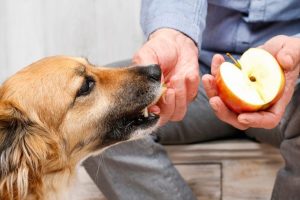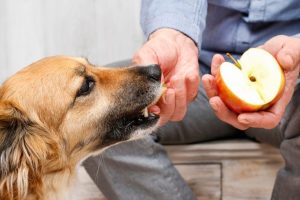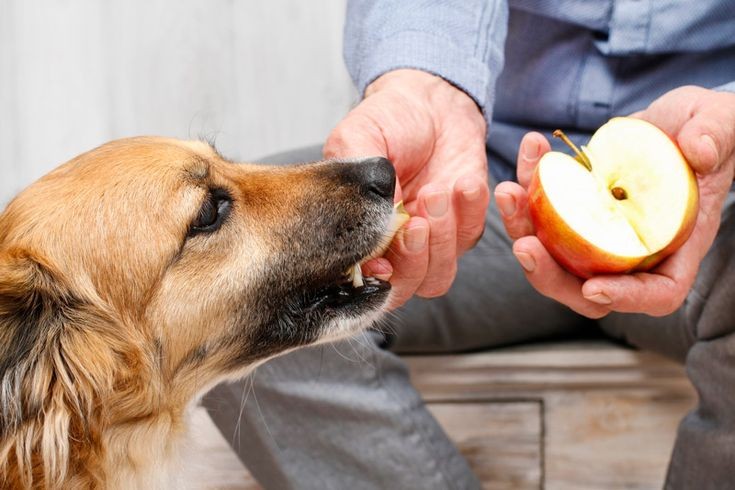some fruits and vegetables for dogs :
Are you wanting to give your pets a healthy veggie or fruit treat but are unsure if it’s safe for your fluffy friend? To avoid confusion for you and any pain for your dogs and cats, we put together a list of some vegetables and fruits dogs and cats can eat and can’t eat.

can dogs eat apples
Fruits Dogs And Cats Can and Can’t Eat :
Can dogs And Cats eat apples?
Yes, dogs can eat apples in moderation. Apples are a good source of vitamins A and C, as well as fiber. However, there are a few precautions to keep in mind:
- Make sure to remove the seeds and core as they contain cyanide, which can be harmful to dogs in large quantities.
- Cut the apple into small, bite-sized pieces to prevent choking.
- Some dogs may be allergic to apples, so it’s advisable to introduce them gradually and monitor for any signs of an allergic reaction, such as itching, swelling, or digestive issues.
- While the flesh of the apple is safe, the core can be a choking hazard. Always remove the core before offering apple slices to your dog.
- Moderation is key. Too many apples can lead to digestive upset due to the natural sugars and fiber content.
Remember that individual dogs may have different tolerances and preferences, so it’s a good idea to consult with your veterinarian before introducing new foods into your dog’s diet, especially if they have any existing health conditions.
Can dogs and cats eat Bananas?
Yes, bananas are generally safe for dogs to eat in moderation. Bananas are a good source of essential nutrients such as potassium, vitamins, and dietary fiber. However, it’s important to keep a few things in mind:
- While bananas are a healthy treat, they are also relatively high in natural sugars. Therefore, it’s important to feed them in moderation to avoid excessive calorie intake.
- Always remove the banana peel before offering it to your dog. While the fruit is safe and nutritious, the peel can be difficult for dogs to digest.
- Depending on the size of your dog, offer banana slices in appropriate, bite-sized portions. Too much of any new food can potentially upset a dog’s stomach.
- As with any new food, introduce bananas gradually and monitor your dog for any signs of allergies or digestive issues.
If you have concerns about your dog’s diet or any potential health issues, it’s always a good idea to consult with your veterinarian. While bananas are generally considered safe for dogs, individual dogs may react differently to new foods.
Can dogs and cats eat Blueberries?
Yes, blueberries are safe and healthy for dogs to eat. Blueberries are low in calories and high in nutrients, making them a great treat option. They are rich in antioxidants, vitamins C and K, and fiber. Additionally, blueberries contain phytochemicals that may provide various health benefits.
Here are some tips for feeding blueberries to your dog:
- Like any treat, it’s important to feed blueberries in moderation. While they are nutritious, too much of any new food can potentially cause digestive upset.
- You can offer fresh or frozen blueberries to your dog. Some dogs enjoy the frozen texture, especially on a hot day.
- Introduce blueberries gradually into your dog’s diet and observe for any signs of allergies or sensitivities.
- If you’re giving your dog frozen blueberries or blueberry-flavored treats, make sure they don’t contain added sugars or artificial sweeteners, as these can be harmful to dogs.
As always, if you have any concerns about your dog’s diet or if they have existing health conditions, it’s a good idea to consult with your veterinarian before introducing new foods.
Can dogs and cats eat Cantaloupe ?
Yes, cantaloupe is generally safe for dogs to eat in moderation. Cantaloupe is a hydrating and nutritious fruit that contains vitamins A and C, as well as dietary fiber. However, as with any new food, it’s important to introduce it gradually and in moderation.
Here are some guidelines for feeding cantaloupe to your dog:
- Make sure to remove the seeds and rind before offering cantaloupe to your dog. The seeds can be a choking hazard, and the rind may be difficult for some dogs to digest.
- Cut the cantaloupe into small, bite-sized pieces to make it easier for your dog to eat and reduce the risk of choking.
- While cantaloupe is a healthy snack, it contains natural sugars, so it’s best to offer it in moderation to avoid excessive calorie intake.
- Monitor your dog for any signs of allergies or sensitivities when introducing cantaloupe into their diet for the first time.
- If your dog has any existing health conditions or dietary restrictions, it’s a good idea to consult with your veterinarian before adding new foods to their diet.
As always, individual dogs may react differently to new foods, so it’s important to pay attention to your dog’s reactions and adjust their diet accordingly. If you have any concerns, consult with your veterinarian for personalized advice.

some fruits and vegetables for dogs
Vegetables Dogs And Cats Can and Can’t Eat :
Can dogs and cats eat Asparagus ?
Yes, dogs can eat asparagus, and it can be a healthy addition to their diet when prepared appropriately. Asparagus is a nutritious vegetable that contains vitamins A, C, and K, as well as folate and fiber. However, there are a few things to consider when feeding asparagus to your dog:
- Cooked Asparagus: It’s best to feed your dog cooked asparagus rather than raw. Cooking makes asparagus softer and more digestible for dogs.
- Plain Preparation: Avoid adding any seasonings, spices, or sauces to the asparagus. Dogs don’t need added seasonings, and some can be harmful to them.
- Cut into Bite-Sized Pieces: Cut the asparagus into small, bite-sized pieces to prevent choking and make it easier for your dog to eat.
- Moderation: As with any new food, introduce asparagus gradually and in moderation. Too much of any new food can potentially cause digestive upset.
- Monitor for Digestive Issues: While many dogs can tolerate asparagus well, some may be sensitive to it. Monitor your dog for any signs of digestive issues, such as diarrhea or vomiting, and adjust the amount accordingly.
- Consult with Your Vet: If your dog has any existing health conditions or dietary restrictions, it’s always a good idea to consult with your veterinarian before introducing new foods, including asparagus.
Remember that every dog is different, and some may not be interested in or may not tolerate certain vegetables. If you have any concerns about your dog’s diet, it’s best to seek advice from your veterinarian.

what are some fruits and vegetables that dogs can eat
Can dogs and cats eat Broccoli ?
Yes, dogs and cats can eat broccoli, and it can be a healthy addition to their diet. Broccoli is a nutritious vegetable that contains vitamins C and K, fiber, and various antioxidants. However, there are a few considerations to keep in mind when feeding broccoli to your dog:
- Cooked is Better: While dogs can eat raw broccoli, it’s easier for them to digest when cooked. Steaming or boiling broccoli is a good way to make it more palatable and digestible for your dog.
- Avoid Seasonings: Do not add any seasonings, spices, or sauces to the broccoli. Dogs don’t need added seasonings, and some can be harmful to them.
- Cut into Small Pieces: Cut the broccoli into small, bite-sized pieces to prevent choking and make it easier for your dog to eat.
- Moderation: As with any treat or addition to your dog’s diet, feed broccoli in moderation. Too much of any new food can potentially cause digestive upset.
- Monitor for Gas: Some dogs may produce gas when they eat broccoli, so it’s a good idea to introduce it gradually to see how your dog reacts.
- Consult with Your Vet: If your dog has any existing health conditions or dietary restrictions, it’s always a good idea to consult with your veterinarian before introducing new foods, including broccoli.
Remember that individual dogs may have different preferences and tolerances, so monitor your dog’s reactions and adjust their diet accordingly. If you notice any adverse reactions, consult with your veterinarian.


